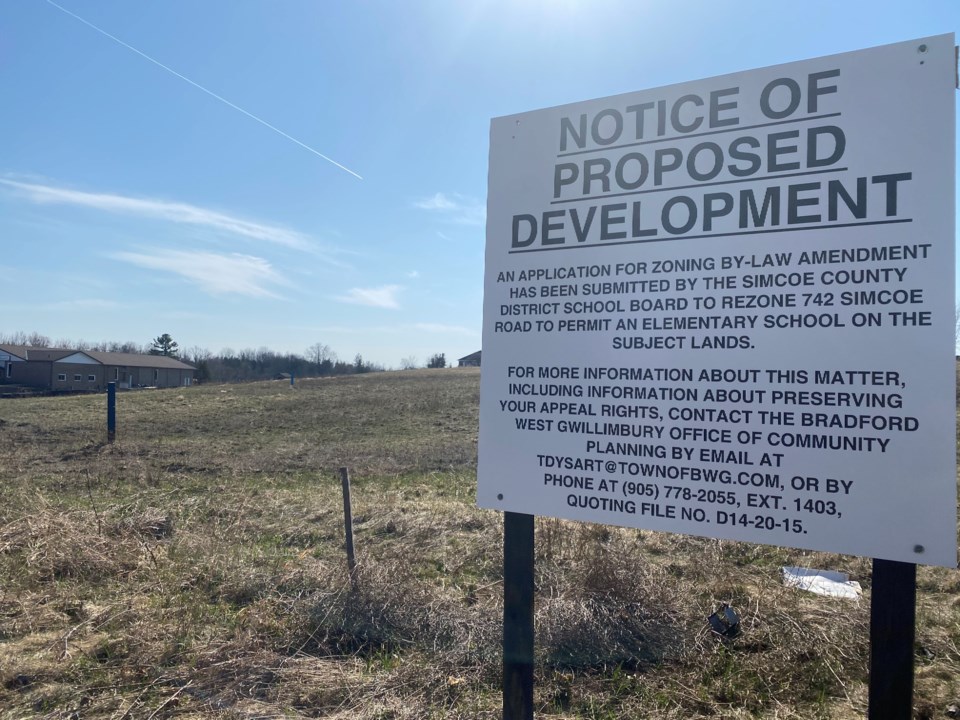The Simcoe County District School Board gave preliminary approval on Wednesday to allow the board to borrow up to $100 million in order to make up for the shortfall of money they need to buy land for new schools over the next four years.
This marks the first time the board has had to consider adding such a borrowing bylaw to their books.
Orillia/Ramara/Severn trustee Jodi Lloyd put the $100 million number in context during the board’s business and facilities standing committee meeting on March 6, noting the board is typically paying about $10 million for land for one school at this point due to rising land costs.
“It’s not significant, it’s staggering, but so is the cost of land,” she said, adding that the board has written multiple letters about the issue to the ministry of education over the years. Superintendent of facility services Corry Van Nispen also noted that the ministry had been consulted on the new borrowing bylaw.
“We have no other option but to move forward on something like this,” said Lloyd. “It’s an issue that’s not moving at the ministry.”
The funding for building new schools anywhere in the province is provided through two funding streams: education development charges pay for the land, while capital priority funds from the province pay for the construction and building of schools.
When a building permit is pulled for a new development in any municipality, education development charges are collected and sent by the municipality to the school board to prepare for the building of a school to accommodate the growth that will be brought to the area by the development.
In 2018, the provincial government froze education development charges. In June 2019, the province passed amending legislation allowing boards to pass new bylaws, however new development charge rates had to be phased in.
As of 2022, the residential rate for the Simcoe County public board stood at $2,811 per residential unit, while the Catholic board stood at $1,472 per residential unit.
This past fall, the Simcoe County public and Catholic boards embarked on public consultation to increase EDCs to keep up with growth, however, the increase permitted is mandated by the province.
According to a background study on the matter completed by Watson & Associates, 83,965 new housing units are projected to be built in Simcoe County over the next 15 years.
The study projects this would bring an increase of 17,918 new elementary students and 6,531 secondary students to the public system in that time frame, while the Catholic board's expected enrolment will increase by 5,407 elementary and 2,142 secondary students.
Due to the student influx, the study estimates 34 new elementary schools and five new secondary schools will be needed for the public board.
Based on the study, it is estimated that $186 million will need to be spent on land acquisition and site preparation costs for new public schools over the next four years, however development charges are only expected to bring in $89 million in that same time frame.
From October 2023 to October 2024, the public board’s development charges were sitting at $3,111 per residential unit.
The study notes this pales in comparison to what was actually needed, as education development charges are only 30 per cent of what the school board needs keep up with Simcoe County growth. The actual amount the board needs to collect is $8,854 per residential unit.
“Education Development Charge revenues coming in are not, and will not, keep up with the expenditures we’re foreseeing for land purchases,” Van Nispen explained to trustees on Wednesday.
During discussion, New Tecumseth trustee Sarah Beitz asked how much the board could expect to be paying in interest by going down this road. She also asked how long it would take to pay a loan off.
“The ministry could come up with a new plan to address this and we’ll somehow get the funding for it. Growth could happen faster or slower,” said Van Nispen, noting that in speaking with the board’s bank, borrowing would happen through a line of credit. “We would use it as we need it and apply education development charge dollars against the line of credit.”
“We will only borrow exactly what we need until at some time, EDCs catch up,” he said.
Van Nispen said the last interest rate he discussed with the bank was prime less half a per cent or three-quarters of a per cent, but that the bank had special interest rates for schools and the bank was planning to get back to him on a final interest amount.
Following the meeting in an interview, Lloyd linked the recent change to the capital priority funding model from the province now requiring boards purchase land before the ministry of education will approve a project, and before the board knows if it will get approval to build a new school.
“It’s a sharp contrast to what we’ve done previously,” said Lloyd. “Prior to this, we had to wait until we got capital funding and then move forward on land. It would cause delays that were years long.”
Lloyd said the money to support growth has to come from somewhere, and if the province won’t provide it or allow school boards to collect what they need, it’s inevitable school boards will have to explore other options.
“I am concerned, because the growth is happening and there are costs associated,” said Lloyd. “I don’t believe freezes or restrictions work.”
“Under-collecting our education development charges is creating a significant problem,” she said.
At the end of discussion at Wednesday’s meeting, trustees voted in favour of approving the new borrowing bylaw. The decision will need to be ratified at the next regular board meeting on March 27 before going into effect.


.png;w=120;h=80;mode=crop)